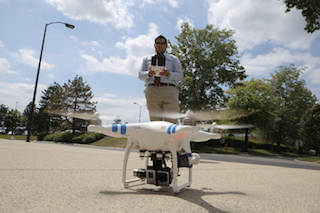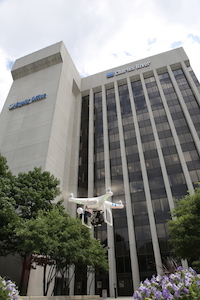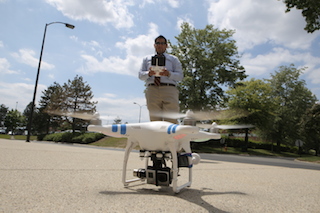 The use of remote-controlled aerial systems has been a hot topic recently as a result of the different rules and regulations in place governing their use in the United States. These systems are classified as UAVs (Unmanned Aerial Vehicles) and are commonly called drones or UASs (Unmanned Aerial Systems). The Federal Aviation (FAA) maintains that its current regulations ban the use of these systems for any and all commercial purposes while UAV use by hobbyists is approved. Many feel that the current rules and regulations in place by the FAA are not very clear and consistent and need to be solidified as soon as possible so US businesses and individuals can take advantage of this technology that has the ability transform the world videography and impact many industries. The FAA has addressed some of the speculation regarding drone usage here.
The use of remote-controlled aerial systems has been a hot topic recently as a result of the different rules and regulations in place governing their use in the United States. These systems are classified as UAVs (Unmanned Aerial Vehicles) and are commonly called drones or UASs (Unmanned Aerial Systems). The Federal Aviation (FAA) maintains that its current regulations ban the use of these systems for any and all commercial purposes while UAV use by hobbyists is approved. Many feel that the current rules and regulations in place by the FAA are not very clear and consistent and need to be solidified as soon as possible so US businesses and individuals can take advantage of this technology that has the ability transform the world videography and impact many industries. The FAA has addressed some of the speculation regarding drone usage here.
The case of a drone pilot taking aerial footage for an advertisement for the University of Virginia Medical Center (see story here) brought to light these inconsistencies and generated a lot of discussion on the matter. The FAA fined Raphael Pirker, the businessman flying the drone at the time, $10,00 because he didn’t have FAA authorization to use the UAS for commercial purposes. The judge sided with Pirker saying there were no specific rules prohibiting him from using the drone. This case provoked us to do more serious investigation on the matter.
 Because we at McElroy Films are eager to offer UAV services to our customers, we have been talking to the FAA to clarify the current regulations and ensure we are as informed as possible. With our lawyers, we discussed with FAA Sources, Aviation Inspector at the FAA, some more details on UAV use. He says events similar to Pirker case are happening all over the country. “Most of them get ‘ratted’ out by a competitor– not really a good situation. Most are not pilots so they don’t approach things with the mindset that a pilot would” FAA Sources explains.
Because we at McElroy Films are eager to offer UAV services to our customers, we have been talking to the FAA to clarify the current regulations and ensure we are as informed as possible. With our lawyers, we discussed with FAA Sources, Aviation Inspector at the FAA, some more details on UAV use. He says events similar to Pirker case are happening all over the country. “Most of them get ‘ratted’ out by a competitor– not really a good situation. Most are not pilots so they don’t approach things with the mindset that a pilot would” FAA Sources explains.
“Using an aircraft – and the FAA considers a UAS as an aircraft – for commercial purposes without a commercial license, airworthiness, or a Part 135 certificate is certainly under the authority of the FAA,” says FAA Sources. He says there are currently two ways for a civil operator to operate a UAS in the National Airspace System (NAS): as a hobbyist or modeler and with an experimental certificate or SAC-EC (Special Airworthiness Certificate- Experimental Category). However, only (non-commercial) categories this can be used for are research and development, crew training and market survey.“The staff at AFS-80 is furiously working to get what is called the ‘Small Rule’, or Small Unmanned Aircraft Systems (SUAS) Rule on the street, which is due out this year,” says FAA Sources. “There is currently no licensing or authorization that is available, which is one intent of this rule.”
McElroy Films CEO Ben McElroy says that he and his team are looking forward to the “Small Rule” to be able to use the drone to further enhance their videos and be the first to market with this service. “As always, we want to ensure that we are following all of the proper protocol of the industry, which sometimes requires a bit of investigation, especially as new technologies come about,” says McElroy. “There is great potential for UAV aerial videography to really transform the industry and we are excited to be one of the leading companies to do so once it is approved.”

